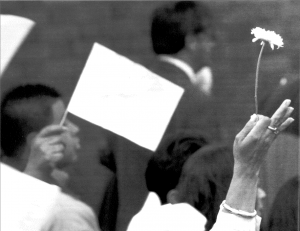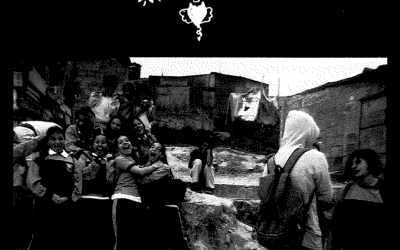The National Conciliation Commission
A Hope for Peace

Woman protesting the kidnapping of a bishop. Photo by Zoe Seslky.
I remember it clearly. I picked up the phone at Flota Mercante Grancolombiana, a soon-to-be liquidated Colombian shipping line where I served as an external legal advisor. On the other line was human rights advocate Ernesto Borda, who asked me if I wanted to help in a mission to verify the first ever agreement reached between the Colombian government and the National Liberation Army (ELN). It was October 25, 1997.
Only a few days before, I had been talking with Monsignor Alberto Giraldo about the possibility of replacing my good friend Miguel Ceballos as Executive Secretary to the National Conciliation Commission. I said yes to Borda immediately—I was glad to grab the chance to move away from the cold and austere offices of the now vanishing ocean fleet—and went off, with my wife’s and parents’ blessing, to the first “baptism of fire” in my new position as secretary of the National Conciliation Commission.
The agreement I was to verify involved the release of three Organization of American States electoral observers kidnapped by guerrillas as they were serving as witnesses to the proper conduct of parliamentary elections in remote municipalities of eastern Antioquia, a beautiful bucolic region where most of Colombia’s hydro electric power is generated. The verification commission was to ensure that both guerrilla and army forces would not engage in “offensive military operations” during the liberation process.
The verification commission was headed by Monsignor Alberto Giraldo Jaramillo, the Archbishop of Medellín and then President of the Episcopal Conference and of the National Conciliation Commission, and by OAS Colombia Director Felix Palma. Its members included representatives of the National Conciliation Commission, including myself, the parish priests of Granada and Cocorná, and some of the non-Colombian OAS officials who had been observers to the recent October 1997 parliamentary elections, and whose colleagues had been abducted.
The “verifiers” organized ourselves under Borda’s leadership in the field in the town of Granada—which would be completely destroyed in 2001 by Revolutionary Armed Forces of Colombia (FARC) guerrillas—and set out for four days to patrol the roads and mountains of the region, from Cocorná and La Piñuela to San Luis in the Bogotá-Medellín Highway, San Carlos and San Francisco. The latter town had already been attacked once by ELN bombs in 1997, and would be flattened by the same guerrillas in 2001. While we patrolled these beleaguered towns, high level arrangements were being made for the liberation of the captives in the town of Santa Ana.
The National Conciliation Commission was created by the President of the Colombian Episcopal Conference on August 4, 1995, as an autonomous and independent entity with the fundamental objective of generating conditions of trust between the government and the various insurgent movements, in order to reach a negotiated political solution to the Colombian armed conflict. The Commission, which aims to create confidence in and build consensus among society, devises and proposes formulas to overcome the difficulties that obstruct the concurrence of the conflicting parties, and motivates society to participate in the construction of peace.
The fifteen members of the Commission, led today by its founder Cardinal Pedro Rubiano Sáenz, Archbishop of Bogotá and current President of the Episcopal Conference of the Catholic Church, are prominent Colombians summoned by Sáenz from all sectors of society; former Ministers of State, trade unionists, journalists, businessmen and university scholars are all brought together to serve their country in the quest for peace.
To pursue its goals, the Commission set out in its early stages to propose the foundations and guidelines for a national permanent peace policy, which would congregate the wills of all sectors and regions of Colombian society under a common understanding of what such a policy means and what it seeks to achieve. For this, the Commission engaged in a wide ranging promotion of its document proposal, “Towards the Shaping of a National Permanent Peace Policy,” which has been the subject of national discussion, review and improvement by Colombian society and has also elicited reflections and comments from the insurgent groups.
A fundamental pillar of this policy is the conviction that, in order to achieve genuine and lasting peace, Colombia requires a negotiated solution to the armed conflict as well as the active participation of its civil society in building the groundwork for a Nation in which peace is supported by equality and social justice. Civil society’s agenda for peace is therefore broad and work is just beginning.
Another element of the policy is the defense and promotion of human rights, and the application of principles of international humanitarian law to non-international conflicts, as proclaimed in Article 3 of the Geneva Conventions and Protocol II. The Colombian government has ratified both the conventions and their protocol, but the Commission has insisted that Article 3 is imperative to all parties to the conflict, and not only for government forces to observe. In 1998 the Commission, together with the International Committee of the Red Cross (ICRC) and Universidad Javeriana produced and presented a proposal for a humanitarian agreement, incorporating the principles and rules of humanitarian law into a comprehensive document to be negotiated and signed by the government and armed groups as a first, confidence building phase in the road towards peace negotiations.
With its work, the National Conciliation Commission has obtained the confidence of the parties and of Colombian society. State officials have expressed such confidence in the Commission that they have sought it to mediate with the guerrillas. The guerrillas have also expressed in various ways, including press releases and communiqués, their confidence in the National Conciliation Commission and the acknowledgment of its validity as a counterpart in peace and humanitarian dialogue. Former President of the Commission, Monsignor Giraldo Jaramillo, was an active member of the negotiation table during the peace process between 1998 and 2002, and despite the failure of the talks on February 20, 2002, he still maintains a high degree of trust from left and right-wing illegal armed movements.
The international community has also made encouraging and meaningful gestures of trust and confidence towards the Commission, and has commended its work as one that creates hope in achieving a political solution to the Colombian conflict. Also of relevance has been the support received by the Commission by the Holy See, various Episcopal Conferences around the world, the World Council of Churches, the Inter-American Human Rights Commission, the United Nations, the OAS, the International Committee of the Red Cross (ICRC) and other international organizations, as well as the constant encouragement and assistance from ambassadors accredited in Colombia.
The Commission continues to be engaged in seeking peace and creating the necessary conditions for negotiations. Today three of its members—former Minister of Labor and social and labor activist Angelino Garzón, Monsignor Luis Augusto Castro, Archbishop of Tunja and Vice President of the Episcopal Conference, and Father Darío Echeverry, General Secretary of the Commission—constitute the Facilitation Commission set up in January 2003 to seek a humanitarian agreement between the government and the FARC. They and other Commission members are also involved in the Civil Commission to Facilitate the Dialogue with ELN. Furthermore, the Commission is providing support to members of the Catholic Church who are involved in the government’s efforts to achieve a peace settlement with right-wing paramilitary organizations.
In addition to that, since early 2002 the Commission has been a member of the Harvard-Colombia Initiative and is committed to advancing this project as one of its main objectives for the coming years. This initiative, together with its plans to create and sponsor Regional Conciliation Commissions, constitute its strategy to renew its efforts to promote and strengthen the participation of Colombian civil society in the political solution of the Colombian armed conflict.
The National Conciliation Commission, with the support and blessing of the Church, will not falter in its efforts to seek peace and reconciliation among Colombians and will continue to be a true instrument of hope for peace in Colombia.
Alvaro E. Campos is Executive Secretary to the National Conciliation Commission in Colombia. He is also a member of the Human Rights and International Relations Institute at Universidad Javeriana and has been a professor and lecturer at the same university in the School of Political Science and International Relations.
Related Articles
Editor’s Letter
This is a celebratory issue of ReVista. Throughout Latin America, LGBTQ+ anti-discrimination laws have been passed or strengthened.
Editor’s Letter: Colombia
When I first started working on this ReVista issue on Colombia, I thought of dedicating it to the memory of someone who had died. Murdered newspaper editor Guillermo Cano had been my entrée into Colombia when I won an Inter American…
Photoessay: Shooting for Peace
Photoessay: Shooting for PeacePhotographs By The Children of The Shooting For Peace Project As this special issue of Revista highlights, Colombia’s degenerating predicament is a complex one, which needs to be looked at from new perspectives. Disparando Cámaras para la...



